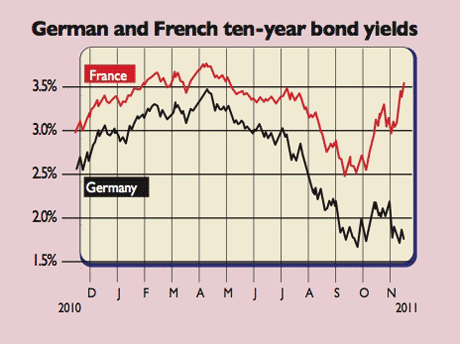
The eurozone sovereign debt crisis has “spread like a fast-growing cancer” from the periphery to “more vital organs”, says Matthew Campbell in The Times. Italy’s bond yields have spiralled and now France “is showing signs of infection”. Since early October, France’s ten-year bond yield has jumped from around 2.6% to more than 3.5%. The spread over the German ten-year yield reached a euro-era high this week.
Part of the jump was due to ratings agency Standard & Poor’s posting a note on its website last week downgrading France’s credit rating. It then quickly withdrew the statement, saying France’s AAA grade, the top rating, was safe. But the worry is that the loss of the triple-A rating is only a matter of time. As the economist Jacques Attali has pointed out, as far as markets are concerned, France is already sub-AAA.
The correlation between French and German debt in the markets has fallen, “suggesting that investors are starting to see France as less of a safe haven and more of a credit risk”, agrees Neil Unmack on Breakingviews. One issue is its own debt picture. France has the highest overall public debt pile in the G7, close to 90% of GDP.
It hasn’t balanced its budget in 30 years and last year the budget deficit hit 7.1% of GDP. Now the economy is slowing and could well stall this quarter, according to a Bank of France survey. That means France will struggle to hit its 2011 deficit target of 4.5%.
Then there’s the potential additional burden from a rescue of Italy. Given France’s already high debt, its status as a key guarantor of the eurozone rescue fund implies a rising debt burden if the fund has to raise yet more money in the markets. The fund’s credit worthiness depends in turn on France’s triple-A rating; without it, raising money will be far harder.
Finally, French banks are among the most exposed to Italian sovereign debt. BNP Paribas and Crédit Agricole, for instance, jointly hold more than €20bn of Italian paper. So if Italian bonds fall further, fears of a bail-out increasing public liabilities will spread. France has already passed two austerity packages in recent months to placate markets, says Unmack. If it is to fight off “Italian flu” and allay fears of an eventual French default, it may “have to become even more convincing”.